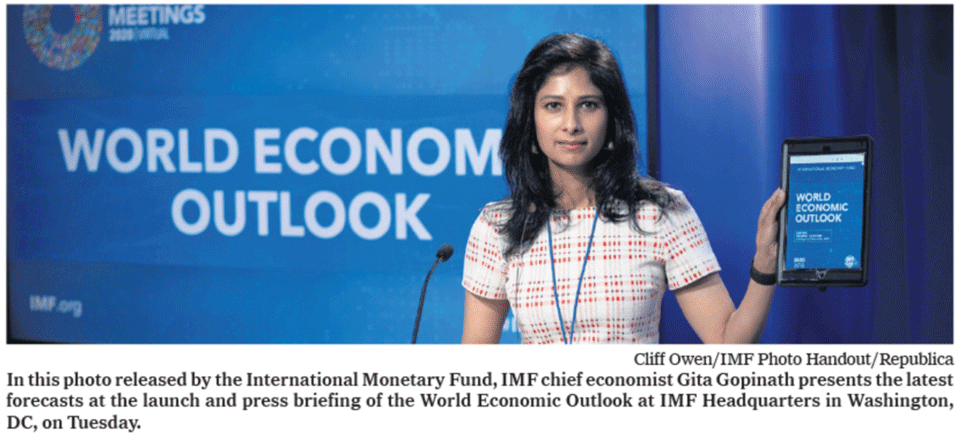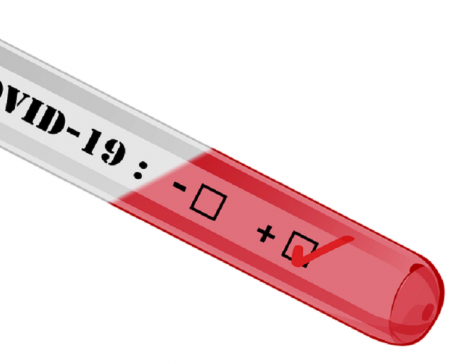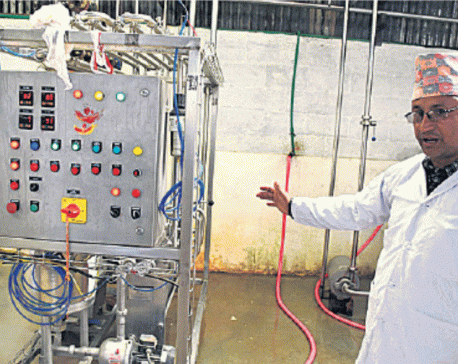
OR
IMF cuts Nepal's growth forecast to 2.5% due to COVID-19
Published On: April 15, 2020 01:20 PM NPT By: Sagar Ghimire | @sagarghi

KATHMANDU, April 15: The International Monetary Fund (IMF) has also sharply lowered Nepal's growth forecast in response to the COVID-19 pandemic that threatens to wreak havoc on the global economy.
Releasing the World Economic Outlook (WEO) on Tuesday, the Washington-based fund slashed Nepal's economic growth projection to 2.5% in the current fiscal year 2019/20. This is a downward revision from 6% growth that the IMF had forecast in October last year.
With this projection, the IMF has joined other forecasters like the Asian Development Bank and the World Bank to downgrade Nepal's growth forecast amid looming economic crisis posed by the pandemic.
The ADB on April 3 trimmed Nepal's growth forecast to 5.3% while the World Bank's forecast that came on Sunday projected the country's economic growth to remain between 1.5% and 2.8%.
“For a country like Nepal where the tourism is an important source of revenue, this is a big hit. Because the sector that has been most hit during the crisis is travel, tourism, hospitality and entertainment,” said Gita Gopinath, chief economist of the IMF, in a press briefing in response to Republica's question about Nepal's economic outlook.
While forecasts are painting a bleak economic picture, the government still scrambles to assess the economic damages that the COVID-19 has or could pose.The recent growth forecasts are way lower than the government's stated target to achieve 8.5% economic growth in the current fiscal year.
In its half-yearly forecasts, the IMF has said that the global growth in 2020 will fall to -3%. The negative growth makes the Great Lockdown the worst recession since the Great Depression, and far worse than the Global Financial Crisis, according to the report.
NEPAL GETS DEBT SERVICE RELIEF
Meanwhile, the IMF has also decided to provide Nepal along with other 24 vulnerable countries a debt service relief.
The IMF has said that the debt service relief is a part of the fund's response to help address the impact of the COVID-19 pandemic. Under this relief, Nepal will receive a grant from the IMF's
Catastrophe Containment and Relief Trust (CCRT) to service its outstanding debt to the fund for an initial phase over the next six months.“This provides grants to our poorest and most vulnerable members to cover their IMF debt obligations for an initial phase over the next six months and will help them channel more of their scarce financial resources toward vital emergency medical and other relief efforts,” IMF's Managing Director Kristalina Georgieva said in a statement.According to Nepal Rastra Bank (NRB), Nepal will have to make a repayment of 3.2 million SDR (approximately US$ 4.4 million, or Rs 40 million) in 2020. This means Nepal will get roughly Rs 20 million in debt relief from the IMF. However, the exact amount that the country will receive in debt service relief could not be confirmed. “Further country details will follow in the coming few days,” said a senior communication officer at the IMF in response to Republica's question about the amount on debt service relief.As a financial support to address the urgent balance of payments and fiscal needs associated with the rehabilitation and reconstruction efforts in the aftermath of the 2015 earthquakes, Nepal had borrowed SDR 35.6 million ($49.7 million) from the IMF under its Rapid Credit Facility (RCF).
Nepal has been repaying this debt to the IMF.
Low-income countries like Nepal will be hit hard - Gita Gopinath, Chief Economist, IMF
For low-income countries, the challenges of this crisis are just manifold. On one hand, they have to deal with health crisis as their health system is not as strong as in the advanced world, and they have lesser fiscal space to do the kind of spending that is required.
For a country like Nepal where the tourism is an important source of revenue, this is a big hit. Because the sector that has been most hit during the crisis is travel, tourism, hospitality and entertainment. What should countries like these do? At this time, it is important to do whatever it takes on health front to make sure that necessary spending is done.
It's also very important to support your workers and many others who are in the informal sector. That would require using mechanisms like cash transfers and digital payment systems to reach the workers who work on daily wages and at the same time support medium and small enterprises so that once this pandemic ends and there is a resumption of global activity in all parts of the world, these countries can also improve. Also, I would like to mention that for low-income countries that have high level of debt burden, it is very important for creditors around the world to step up and provide debt relief.
You May Like This

State-1 reports coronavirus infection in 29 persons so far
BIRATNAGAR, April 25: Coronavirus infection has been found in 29 persons in State-1 so far, the Information Desk under the... Read More...

Dairy products worth Rs 5b lying unsold due to lockdown
KATHMANDU, April 15: Dairy producers have dairy products worth nearly Rs 5 billion in stock due to lack of demand... Read More...

Govt mulling to divert MPs development fund to Covid-19 response
KATHMANDU, April 13: After India suspended the budget allocated to be spent under members of parliament for two years, Nepal... Read More...











Just In
- Challenges Confronting the New Coalition
- NRB introduces cautiously flexible measures to address ongoing slowdown in various economic sectors
- Forced Covid-19 cremations: is it too late for redemption?
- NRB to provide collateral-free loans to foreign employment seekers
- NEB to publish Grade 12 results next week
- Body handover begins; Relatives remain dissatisfied with insurance, compensation amount
- NC defers its plan to join Koshi govt
- NRB to review microfinance loan interest rate







Leave A Comment